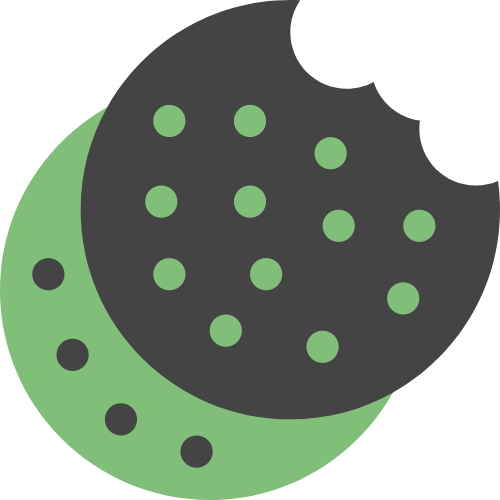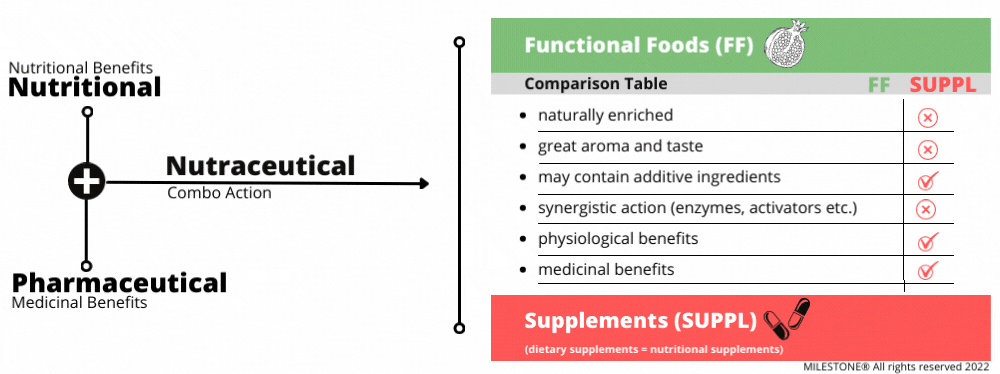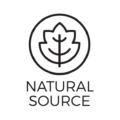
- Food Science
-
by k.mammasis
Are you onto fighting inflammation through your diet? Then it is the right time to consider functional foods for inflammation and avoid typical supplements. You can permanently reduce inflammation by choosing carefully what you eat; this is the essence of functional nutrition and unfortunately, not many of us know about it. At MILESTONE®, we research and develop functional foods that may heal your inflammation naturally – so take your time and navigate to our corresponding foods for inflammation category and learn more about the uniqueness of our formulas. If you are an athlete with a demand for performance or someone in chronic pain, then head over to our new article and discover the 5 best foods for inflammation that can get you healed in less than 3 months.
What are Functional Foods for Inflammation?
There is a certain category of foods that simply function beyond basic nutrition. These foods are called functional because they tend to regulate a particular health function in your body. They do so by providing a set of enzymes, co-enzymes, nutrients, and bioactive compounds that work synergistically. As a result, they offer higher bioavailability rates than common supplements, have a longer effect, and are much more effective. One of the most experienced conditions in today’s world is inflammation. Inflammation is a typical response of your body to infection or damage. It occurs when damaged tissue produces molecules that signal white blood cells to begin healing. However, inflammation can be low-grade, widespread, and chronic in some cases 1 2. Chronic inflammation can be harmful to your body. It can contribute to the formation of plaque in your arteries, increasing your risk of heart disease and stroke. It’s also linked to an increased risk of cancer, diabetes, and other chronic diseases.
What is less known, however, is that you can fight this naturally by including foods for inflammation in your daily diet. Functional foods specifically designed for healing inflammation, typically contain natural anti-inflammatory properties that are not commonly found in everyday food. An example of such compounds is omega-3 fatty acids, that is linked with a great anti-inflammatory response, vitamin D3 too, oleocanthal (contained in high phenolic olive oil), and many other similar bioactive compounds and vitamins. If you are considering avoiding synthetic ingredients, functional foods are the most natural solution out there with results already seen within the first three (3) months of consumption.
Why are Functional Foods Better than Conventional Supplements?
The answer to this fundamental question cannot be short but it is greatly summarized in the following quotes:
The vitamins and biochemical compounds found within our functional foods are not isolated. They are highly complex structures that combine a variety of enzymes, coenzymes, antioxidants, trace elements, activators and many other factors all working together synergistically, to enable these natural healthy foods to do their job in your body. Nutrients from within this complex cannot be isolated from the whole, and then be expected to be as effective in the body as the whole complex is designed to do, says Judith A. DeCava, CNC, LNC
Many experimental studies have shown that components of foods or beverages may have anti-inflammatory effects, Dr. Frank Hu, Professor of Nutrition and Epidemiology at the Harvard School of Public Health’s Department of Nutrition.
You may also take a look at the key differences between the two, as illustrated in the above schematic. We also consider our article that discusses natural vs synthetic ingredients worthy of reading. The conclusion is that functional foods work with a much higher level of synergy that cannot be matched by the synthetic approach of supplements, where most bioactive compounds cannot even exist at first place. This is mainly due to the isolation process that transforms the principal bioactive compounds into derivatives, some of which are completely ineffective to our genes. So when it comes to healing foods always remember that there is no better alternative to functional foods.
The 2 Best Functional Foods That Can Heal Inflammation
Dr. Hu suggests drinking and eating certain foods to reduce inflammation and, as a result, chronic disease. He indirectly highlights pomegranates, blueberries, apples, and healthy oils as meals and vegetables strong in natural antioxidants and polyphenols—protective compounds found in plants. 3, and leafy greens4. Consider the Mediterranean diet if you want to eat in a way that closely adheres to the principles of anti-inflammatory food. Below you can find our 2 best functional foods for inflammation.
1. Pomegranate Concentrate with Turmeric Extract + D3
When it comes to anti-inflammatory foods, the antioxidants contained, play the most important role. This is why we consider this product to be Nature’s Powerhouse when it comes to healing inflammation. Our pomegranate concentrate has record high polyphenol levels, which practically means that it will provide you with complete natural support against free radicals. In addition, this is combined with the most bioavailable form of curcumin 5 6 extract on the planet in order to further intensify the anti-inflammatory strength of this unique product. The micellized version of vitamin D3 that is contained in this product further increases its anti-inflammatory response and transforms it into a healing and functional food for inflammation. We encourage you to read more on the product page.
2. Medical Olive + Algae Vegan Omega 3 Oil (EPA DHA ALA)
The benefits associated with the consumption of medical-grade olive oil are truly remarkable. Inflammation is among its four targeted areas (neuroprotective, cardioprotective, antioxidant, and anti-inflammatory), and as already shown in various clinical trials, the bioactive compound oleocanthal is held responsible for healing inflammation. Oleocanthal behaves much like ibuprofen but surely in a much more natural and effective way. The great anti-inflammatory response of high phenolic olive oil has been numerously demonstrated in recent clinical trials and academic research 7 8 9.
In addition, by daily consuming this functional food for inflammation you will be receiving possibly the best plant-based omega 3 complex that exists. Omega-3 fatty acids 10 11 are “good fats” that may help protect against heart disease, cancer, arthritis, and other conditions. There are not many vegan foods for inflammation that can provide you with an adequate amount of EPA + DHA + ALA on a daily basis, and this is exactly the reason that we designed this product.
MILESTONE Tip: Include these two unique products in your daily diet. They are truly nature’s powerhouse of functional foods for inflammation. Preferably, receive the Omega 3 oil early in the morning, on empty stomach. After 30 minutes, receive a spoon of the pomegranate concentrate + curcumin extract and vitamin D3. It is always useful to remember that polyphenols in high phenolic olive oil are water-soluble (hydrolysis) and for this reason, it is ideal to avoid mixing your medical oil with water – under any conditions. Instead, drink it raw, or add it to your salad or vegetables. If you are in need of a higher daily dosage of vitamin D3, please take the time and visit our High Phenolic Olive + Algae Vegan Vitamin D3 Oil, which will provide you with 600IU of vitamin D3 on every 10ml of this liquid functional food.
Simple Anti-Inflammatory Eating Guidelines
- Consume more plants. Whole plant diets contain the anti-inflammatory elements your body requires. So eating a variety of fruits, vegetables, whole grains, and legumes is a good place to start.
- Focus on antioxidants. They aid in the prevention, delay, or repair of certain forms of cell and tissue damage. They can be found in berries, leafy greens, beets, and avocados, as well as beans and lentils, whole grains, ginger, turmeric, and green tea.
- Get your Omega-3s. Omega-3 fatty acids have a function in controlling your body’s inflammatory process and may aid with inflammation-related pain. These good fats can be found in fish such as salmon, tuna, and mackerel, as well as in lower levels in walnuts, pecans, ground flaxseed, and soy.
- Eat less red meat. Red meat can cause inflammation. Are you a burger fan? Set a reasonable target. A few times a week, try replacing your lunchtime meat with fish, almonds, or soy-based protein.
- Cut the processed stuff. Sugary cereals and drinks, as well as deep-fried foods and pastries, are all pro-inflammatory. They may include a high concentration of harmful lipids associated with inflammation. Below you will find a list of 8 food ingredients that you should avoid.
8 Food Ingredients That Can Cause Inflammation
Inflammatory foods include those high in omega-6 fatty acids.
Although these fats are necessary for bone health, cognitive function, and metabolism (the process through which food is transformed into energy). Too much of them can induce inflammation 12. Here is a list of 8 foods or ingredients to avoid.
1. Sugar 13 14
2. Dairy products (milk, cheese, butter, and ice cream)
3. Margarine – Artificial Trans Fats 15 16
4. Meats or Processed Meat 17 18
5. Vegetable oils (e.g. corn, safflower, soybean, peanut, and cottonseed oil) 19
6. French fries and other fried foods
7. Soda and other sugar-sweetened beverages
8. Refined carbohydrates, such as white bread and pastries 20 21 22
Summary
“Doctors are learning that one of the best ways to reduce inflammation lies not in the medicine cabinet, but in the refrigerator” 23. By eating an anti-inflammatory diet, you can permanently reduce inflammation and dramatically enhance your general health. So, if you are ready to dive in, feel free to navigate to our Inflammation Category and discover the benefits of our functional foods designed with anti-inflammatory benefits.
A Word From MILESTONE®
MILESTONE® Food for your Genes uses only high-quality sources, including peer-reviewed studies, to support the facts within our articles. Read our editorial process to learn more about how we fact-check and keep our content accurate, reliable, and trustworthy.
- Ricker MA, Haas WC. Anti-inflammatory diet in clinical practice: a review. Nutr Clin Pract. 2017;32(3):318-25. doi:10.1177/0884533617700353[↩]
- Grandl G, Wolfrum C. Hemostasis, endothelial stress, inflammation, and the metabolic syndrome. Semin Immunopathol. 2018 Feb;40(2):215-224. doi: 10.1007/s00281-017-0666-5. Epub 2017 Dec 5. PMID: 29209827; PMCID: PMC5809518.[↩]
- Bosma-Den Boer MM, Van Wetten ML, Pruimboom L. Chronic inflammatory diseases are stimulated by current lifestyle: how diet, stress levels and medication prevent our body from recovering. Nutr Metab (Lond). 2012;9(1):32. doi:10.1186/1743-7075-9-32[↩]
- Ricker MA, Haas WC. Anti-inflammatory diet in clinical practice: a review. Nutr Clin Pract. 2017;32(3):318-25. doi:10.1177/0884533617700353[↩]
- Pivari F, Mingione A, Brasacchio C, Soldati L. Curcumin and Type 2 Diabetes Mellitus: Prevention and Treatment. Nutrients. 2019 Aug 8;11(8):1837. doi: 10.3390/nu11081837. PMID: 31398884; PMCID: PMC6723242.[↩]
- Jayarathne S, Koboziev I, Park OH, Oldewage-Theron W, Shen CL, Moustaid-Moussa N. Anti-inflammatory and anti-obesity properties of food bioactive components: effects on adipose tissue. Prev Nutr Food Sci. 2017;22(4):251-62. doi:10.3746/pnf.2017.22.4.251[↩]
- Casas R, Sacanella E, Urpí-Sardà M, Chiva-Blanch G, Ros E, Martínez-González MA, Covas MI; Rosa Ma Lamuela-Raventos, Salas-Salvadó J, Fiol M, Arós F, Estruch R. The effects of the mediterranean diet on biomarkers of vascular wall inflammation and plaque vulnerability in subjects with high risk for cardiovascular disease. A randomized trial. PLoS One. 2014 Jun 12;9(6):e100084. doi: 10.1371/journal.pone.0100084. PMID: 24925270; PMCID: PMC4055759.[↩]
- Segura-Carretero A, Curiel JA. Current Disease-Targets for Oleocanthal as Promising Natural Therapeutic Agent. Int J Mol Sci. 2018 Sep 24;19(10):2899. doi: 10.3390/ijms19102899. PMID: 30250008; PMCID: PMC6213726.[↩]
- Parkinson L, Keast R. Oleocanthal, a phenolic derived from virgin olive oil: a review of the beneficial effects on inflammatory disease. Int J Mol Sci. 2014;15(7):12323-12334. Published 2014 Jul 11. doi:10.3390/ijms150712323[↩]
- Ricker MA, Haas WC. Anti-inflammatory diet in clinical practice: a review. Nutr Clin Pract. 2017;32(3):318-25. doi:10.1177/0884533617700353[↩]
- He Y, Yue Y, Zheng X, Zhang K, Chen S, Du Z. Curcumin, inflammation, and chronic diseases: how are they linked? Molecules. 2015 May 20;20(5):9183-213. doi: 10.3390/molecules20059183. PMID: 26007179; PMCID: PMC6272784.[↩]
- Patterson E, Wall R, Fitzgerald GF, Ross RP, Stanton C. Health implications of high dietary omega-6 polyunsaturated fatty acids. J Nutr Metab. 2012;2012:539426. doi:10.1155/2012/539426[↩]
- Schultz A, Barbosa-da-Silva S, Aguila MB, Mandarim-de-Lacerda CA. Differences and similarities in hepatic lipogenesis, gluconeogenesis and oxidative imbalance in mice fed diets rich in fructose or sucrose. Food Funct. 2015 May;6(5):1684-91. doi: 10.1039/c5fo00251f. PMID: 25905791.[↩]
- Jiang Y, Pan Y, Rhea PR, Tan L, Gagea M, Cohen L, Fischer SM, Yang P. A Sucrose-Enriched Diet Promotes Tumorigenesis in Mammary Gland in Part through the 12-Lipoxygenase Pathway. Cancer Res. 2016 Jan 1;76(1):24-9. doi: 10.1158/0008-5472.CAN-14-3432. PMID: 26729790; PMCID: PMC4703949.[↩]
- Nestel P. Trans fatty acids: are its cardiovascular risks fully appreciated? Clin Ther. 2014 Mar 1;36(3):315-21. doi: 10.1016/j.clinthera.2014.01.020. PMID: 24636816.[↩]
- Hu FB, Manson JE, Stampfer MJ, Colditz G, Liu S, Solomon CG, Willett WC. Diet, lifestyle, and the risk of type 2 diabetes mellitus in women. N Engl J Med. 2001 Sep 13;345(11):790-7. doi: 10.1056/NEJMoa010492. PMID: 11556298.[↩]
- Larsson SC, Bergkvist L, Wolk A. Processed meat consumption, dietary nitrosamines and stomach cancer risk in a cohort of Swedish women. Int J Cancer. 2006 Aug 15;119(4):915-9. doi: 10.1002/ijc.21925. PMID: 16550597.[↩]
- Santarelli RL, Pierre F, Corpet DE. Processed meat and colorectal cancer: a review of epidemiologic and experimental evidence. Nutr Cancer. 2008;60(2):131-144. doi:10.1080/01635580701684872[↩]
- Patterson E, Wall R, Fitzgerald GF, Ross RP, Stanton C. Health implications of high dietary omega-6 polyunsaturated Fatty acids. J Nutr Metab. 2012;2012:539426. doi: 10.1155/2012/539426. Epub 2012 Apr 5. PMID: 22570770; PMCID: PMC3335257.[↩]
- Spreadbury I. Comparison with ancestral diets suggests dense acellular carbohydrates promote an inflammatory microbiota, and may be the primary dietary cause of leptin resistance and obesity. Diabetes Metab Syndr Obes. 2012;5:175-89. doi: 10.2147/DMSO.S33473. Epub 2012 Jul 6. PMID: 22826636; PMCID: PMC3402009.[↩]
- Dixon LJ, Kabi A, Nickerson KP, McDonald C. Combinatorial effects of diet and genetics on inflammatory bowel disease pathogenesis. Inflamm Bowel Dis. 2015 Apr;21(4):912-22. doi: 10.1097/MIB.0000000000000289. PMID: 25581832; PMCID: PMC4366276.[↩]
- Dickinson S, Hancock DP, Petocz P, Ceriello A, Brand-Miller J. High-glycemic index carbohydrate increases nuclear factor-kappaB activation in mononuclear cells of young, lean healthy subjects. Am J Clin Nutr. 2008 May;87(5):1188-93. doi: 10.1093/ajcn/87.5.1188. PMID: 18469238.[↩]
- Harvard Medical School[↩]

















